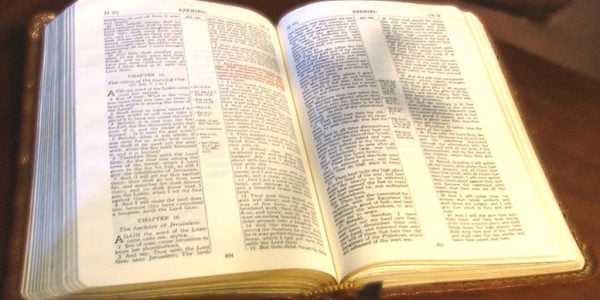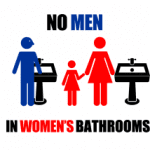
So it’s that time of year known as Reformation Sunday when we remember the anniversary of Martin Luther nailing his 95 theses to the door of the Wittenberg cathedral on October 31, 1517. Most people who are fans of the original Reformation are not fans of the idea that we are going through a reformation today. Because John Calvin got Christianity perfectly right, and if you have any questions about it, you can get them clarified by Hermann Bavinck or Wayne Grudem. But I do think it’s fair to say that Christians today, particularly in the evangelical subculture, are going through a time of vigorous debate and wrestling with the Holy Spirit. Like the original reformation, there are a wide range of stances on the set of issues that are being debated. I’m sure there are more than seven points of contention, but seven is a biblical number, so here are the seven I see.
1) Sovereignty/transcendence of God
Is everything under God’s meticulous control? Or is creation the cross that keeps on crucifying its creator? While the old-guard is deeply invested in the idea of a God who has a perfect plan that is always executed exactly according to his will, many Christians like me are wondering if God’s sovereignty looks more like the pathos of a slaughtered lamb than the omnipotence of a totalitarian emperor.
Anyone who has ever done pastoral care to terminally ill patients is confronted by hard questions about God’s sovereignty. Does God make cancer happen as part of his mysterious purpose? Does God somehow need our solidarity and moral support through prayer to heal cancer? Or does God merely offer the impotence of a crucified savior to sit with the victims of cancer and weep with them? How do we speak of God’s power when we’re talking to people for whom “the plan” isn’t working? No answer seems to do justice to the senselessness of the suffering we encounter and the hope we desperately want to proclaim.
When preachers like John Piper tries to say that bridges collapse and tornadoes strike because of God’s wrath against specific sins, almost everyone is horrified, even though he is speaking the same way that Old Testament prophets spoke about natural disasters in their era. Nothing in the Old Testament ever happened because of ecology or physics. Every natural event was always an expression of God’s favor or God’s wrath. Do we have to understand natural phenomena today in the same way to be faithful to the Bible? How do we understand God’s role in the shaping of destiny today? I want to believe in the perfectly sovereign God who has a perfect plan for my life, but I’m more and more suspicious that God is being crucified by a creation that keeps blowing up in his face and that the best God can offer when things aren’t clicking in my life is the solidarity of Jesus’ suffering on the cross. I’m starting to wonder if God chooses to limit himself and express his sovereignty through the collective action of people who have been drawn together into his body.
2) Jesus and Biblical interpretation
We’re having a lot of debates about how to interpret the Bible, but the most essential one has to do with Jesus’ relationship to the Bible. Are Jesus’ life and teachings the obvious, self-evident continuation of the depiction of God in the Old Testament or do they serve as a correction of misconceptions of God that are reflected in the Biblical text? Jesus certainly says that he came to fulfill the law and the prophets, not to abolish them (Matthew 5:17), but Paul says that Jesus “abolished the law with its commandments and ordinances” (Ephesians 2:15).
So Jesus must be fulfilling the law and the prophets in such a way that Paul can also say that he abolishes the law. Does Jesus’ fulfillment of the law and prophets signify an endorsement of the massacre of the Amalekites in the Old Testament? Is the discomfort Christians today have with Old Testament violence a sign of their weakness in faith or their development of Christlike sensibilities?
To me, the key to understanding how to interpret the Bible is to look at the way Jesus used scripture in contrast with the way his archenemies, the Pharisees, used scripture. I filter every question in Biblical interpretation through a “Jesus vs. the Pharisees” lens. What stance would the Pharisees take? How would they use Bible verses to play gotcha and try to trap Jesus? How would Jesus probably respond based on what he said in his arguments with them in scripture? Jesus did not read the Bible with a perfectly neutral, “objective” hermeneutic. He always had an agenda. He used scripture creatively and subversively in solidarity with lepers, cripples, tax collectors, prostitutes, and every other outsider whom the Pharisees were oppressing.
One thing we cannot do (that many evangelicals do) is to create a good cop/bad cop dichotomy between the Jesus of the New Testament and the Yahweh of the Old Testament. Jesus does not save us from the Yahweh who strikes people dead for touching the Ark of the Covenant. The God who allegedly did all the sadistic things attributed to God by the Old Testament is the same God whom Jesus reveals more perfectly than he ever was revealed before. As John 1:18 says, “No one has ever seen God. It is God the only Son,who is close to the Father’s heart, who has made him known.” If John is telling the truth, then God’s revelation in Christ is perfect in a way that God’s revelation in other theophanies of scripture is not. Can scripture be both “God-breathed and useful for teaching” and also imperfect in its depiction of God? I believe it can.
3) Retributive justice
One of the most glaring failures of American society today is its prison industrial complex. Criminals in our culture are not being rehabilitated. The “justice” that is meted out in response to crime does nothing to restore the damage that it caused to the community. This is the result of our culture’s investment in the concept of retributive justice. Every offense can be quantified into a number of years spent in a cage so that justice is “served” as long as the offender pays that quantity of years of debt. No healing for either the criminal or the victim. It’s been a failure for everyone except for the private prison industry.
The failure of retributive justice in our society has caused many Christians to question what some see as the core of the gospel: that God wants to punish sin by torturing people forever in hell and Jesus dies on the cross so that people can be rescued from that punishment. The idea of punishment serving no purpose other than “payment” does not seem to belong to the gospel. People who are shaped by the fruit of the Spirit are not vengeful. No truly sanctified Christians would demand the eternal damnation of other human beings on their account. Our model is Jesus’ words on the cross: “Father, forgive them for they know not what they do.” If that shows Jesus’ heart, then those words apply to all sinners.
To me, Jesus’ cross does not rescue us from God’s need to punish, but from our need for retributive justice. Jesus makes it clear in his parable of the unforgiving servant (Matthew 18:23-35) that we cannot accept the mercy of God without showing the same mercy to other people. He explains in Luke 6:37-38 that God judges on a sliding scale in accordance with how we judge others: “The measure you give will be the measure you get back.” The purpose is to put us under the sovereignty of God’s mercy, which rescues us from the vicious cycle of retributive justice. Those who accept God’s mercy and become it for others will enter into eternal communion with God and others (a.k.a. heaven). Those who cling to their blamelessness and right to judge will remain outside of that eternal communion (a.k.a. hell).
4) Gender and Sexuality
For the past century, humanity has been going through a revolution in how we understand gender and sexuality. For some conservatives, this revolution has been unequivocally wicked. The word “feminism” represents the great modern evil against which the church must fight with all of its might. These conservatives have conceded certain points only because it’s become untenable not to. Women are no longer scolded for wearing pants or working outside of the home in all but the most radically conservative circles. Some denominations allow women to take on leadership roles in church; others do not.
The big question for Christians is whether patriarchal gender complementarity is God’s permanent plan for humanity. Some Christians say yes; others say no; others are making compromises in between. Will society fall apart if certain roles are not reserved for men and other roles are not reserved for women? Will children be deformed if they are not raised by one anatomical male and one anatomical female? When both the Old and New Testament were written, the presumed answer to these questions was yes. In the context of an ancient tribal patriarchal order, for a man to lie with a man as he does with a woman would destroy the set of boundaries and taboos which preserved the social order. In the context of Roman society, the apostle Paul observed hedonistic sexual practices which included men abandoning their wives for each other.
However, in my view, the conservative fight to defend the complementarity of gender is missing the real problem. Our real problem is that our society has turned sex into a consumer product so that our bodies are no longer icons of God but commodities to be bought and sold in a marketplace. When the church makes morality about denying the legitimacy of sexual and gender otherness, we squander our ability to speak truth about the sacredness of human bodies. I’m interested in figuring out what a post-patriarchal understanding of wholesome sexuality looks likes. I want for the students I work with to love their bodies and avoid the way that they can be cheapened through haphazard intimacies.
5) Colonialism/White Supremacy
The great sin that stands between the original Reformation and today is colonialism (which also goes by the names of racism or white supremacy). Somehow European Christians felt theologically okay with conquering, massacring, and enslaving millions of people around the world. This was done with the explicit blessing of the church as an expression of Jesus’ Great Commission. As 16th century Spanish theologian Juan Gines de Sepulveda wrote, when Jesus declares in Matthew 28:18 that “all authority on heaven and Earth” has been given to him, that authority is transferred to the pope and the Christian princes to impose the laws of Christ upon the heathen nations they conquer and punish those who refuse to accept their imposition.
As Willie Jennings points out in his Christian Imagination, everything about the way that white Christians share the gospel with other people has been shaped by colonialist thought. The ideology of white supremacy originates in the innate superiority of European Christendom. What we today call “white” was originally just “civilized.” Our Greco-Roman Judeo-Christian heritage was what gave European colonists the sacred duty of civilizing the rest of the world.
Those of us who recognize the sin of colonialism are trying to figure out what evangelism looks like in a non-colonial form. Viewing non-Christians as utterly bereft of truth and needing me to come to them with a message that will save them belongs to the colonialist paradigm of evangelism. The best that I’ve been able to come up with is thinking of the journey into God’s kingdom as a pilgrimage on which I am walking with others. I simply bear witness to how I see God moving in my life and other peoples’ lives. And I expect to be evangelized every bit as much as I evangelize others, because the evangelist is not me, but the Holy Spirit.
6) Capitalism/Empire
Coupled with the colonialism of European Christendom is the economic system that emerged from the same people who anointed themselves the vanguard of human civilization. Capitalism is the form in which colonialism continues to manifest itself now that it’s no longer acceptable to call brown people in the Global South “savages” and conquer and enslave them through brute force. Now we teach them the gospel of the free market which includes selling off their natural resources to foreign investors for their profit. The empire of today is not derived in the power of any single nation-state but the plutocracy of the global economic elites.
The Cold War created a dichotomy was between godless communism and Christian capitalism with the idea being that state-mandated sharing happens when there is no God while in the free market, Christianity naturally provides the checks and balances upon the greed that would otherwise overtake the system. If Christianity were actually allowed to critique greed and defend the common good, this might work. But what has taken place is that capitalism itself has become the primary religious system and Christianity has been infiltrated with capitalist logic. This is how “salvation” became an industrial complex and pyramid scheme of recruitment. In terms of numbers, Christianity has worked very well as a capitalist enterprise. Megachurches have taken over the Christian landscape at about the same pace as Walmart Superstores.
Capitalism is like an invasive plant that never stops taking over every garden where it’s planted. Perhaps it’s useful as an economic system within certain boundaries, but when it turns every aspect of life into a consumer product, including education, parenting, and church music, it has overstepped its bounds and must be hacked down. Those of us who are wary of capitalism insist that every object in creation receives its sacred worth from God, not from its exchange value in the marketplace. The market has its place, but the market must be actively contained or else the market will become our god as indeed it has for many Christians.
7) Holiness/The Sacred
What is holiness? That is perhaps the biggest question of today. Many Christians like me are dissatisfied with the way that “holiness” has become a code word for opposition to sexual otherness. In a meritocratic culture, holiness is synonymous with words like discipline, obedience, and sacrifice. It means doing what you’re told and making sure that other people do what they’re told. But I think true holiness is so much better than that.
I see holiness as the elegance and beauty of living in tune with the Holy Spirit. The Bible and Christian tradition are tremendous resources that can help us in the journey of becoming holy. We shouldn’t try to reinvent the wheel. But it is an idiosyncratic journey that each of us must take with God. I worry that the need for uniformity in holiness does not come from an interest in seeing others liberated by God so much as the lust for institutional power.
Our world is starving for an encounter with the sacred. The utilitarian landscape of capitalism has written all semblances of beauty and sacredness out of the story. True holiness happens in the presence of the sacred. Holiness is not primarily about morality. Morality has to do with emptying our heart of idols so that we can be pure enough in heart to see God (Matthew 5:8). It’s a tragedy that so many Christians would rather focus on being the moral police of our society than creating sacred space where others can taste the kingdom. My hunch is that if people encounter sacred space, they will change their lives to get more of that sacred like the merchant who sold everything he had to get the “pearl of great price” (Matthew 13:46). Holiness is a reality that invites us to be artists rather than curmudgeons.
















